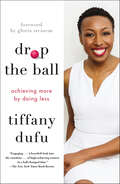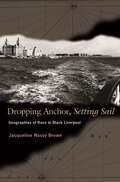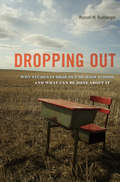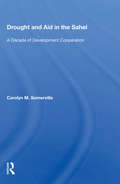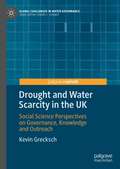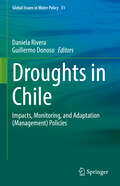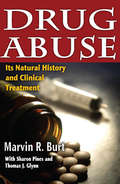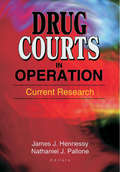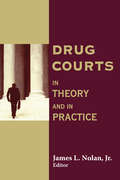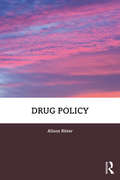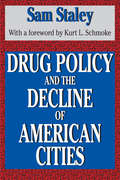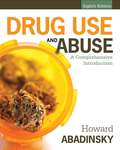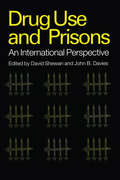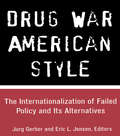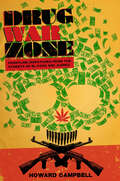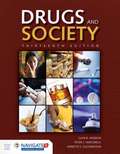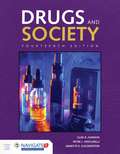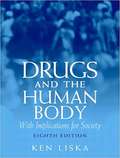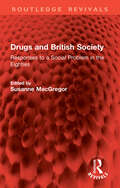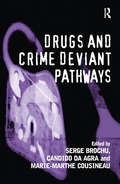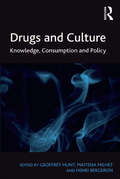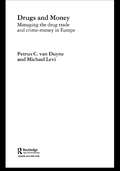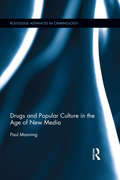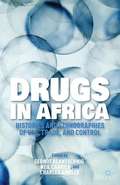- Table View
- List View
Drop That Knowledge: Youth Radio Stories
by Elisabeth Soep Vivian ChávezThis is the first book to take us inside Youth Radio for a fascinating, behind-the-scenes look at a unique, Peabody Award-winning organization that produces distinctive content for outlets from National Public Radio to YouTube.
Drop the Ball: Achieving More by Doing Less
by Tiffany DufuTiffany Dufu's Drop the Ball is a bold and inspiring memoir and manifesto from a renowned voice in the women's leadership movement that shows women how to cultivate the single skill they really need in order to thrive: the ability to let go.Once the poster girl for doing it all, after she had her first child, Tiffany Dufu struggled to accomplish everything she thought she needed to in order to succeed. Like so many driven and talented women who have been brought up to believe that to have it all, they must do it all, Dufu began to feel that achieving her career and personal goals was an impossibility. Eventually, she discovered the solution: letting go. In Drop the Ball, Dufu recounts how she learned to reevaluate expectations, shrink her to-do list, and meaningfully engage the assistance of others—freeing the space she needed to flourish at work and to develop deeper, more meaningful relationships at home. Even though women are half the workforce, they still represent only eighteen per cent of the highest level leaders. The reasons are obvious: just as women reach middle management they are also starting families. Mounting responsibilities at work and home leave them with no bandwidth to do what will most lead to their success. Offering new perspective on why the women’s leadership movement has stalled, and packed with actionable advice, Tiffany Dufu’s Drop the Ball urges women to embrace imperfection, to expect less of themselves and more from others—only then can they focus on what they truly care about, devote the necessary energy to achieving their real goals, and create the type of rich, rewarding life we all desire.
Dropping Anchor, Setting Sail: Geographies of Race in Black Liverpool
by Jacqueline Nassy BrownThe port city of Liverpool, England, is home to one of the oldest Black communities in Britain. Its members proudly date their history back at least as far as the nineteenth century, with the global wanderings and eventual settlement of colonial African seamen. Jacqueline Nassy Brown analyzes how this worldly origin story supports an avowedly local Black politic and identity--a theme that becomes a window onto British politics of race, place, and nation, and Liverpool's own contentious origin story as a gloriously cosmopolitan port of world-historical import that was nonetheless central to British slave trading and imperialism. This ethnography also examines the rise and consequent dilemmas of Black identity. It captures the contradictions of diaspora in postcolonial Liverpool, where African and Afro-Caribbean heritages and transnational linkages with Black America both contribute to and compete with the local as a basis for authentic racial identity. Crisscrossing historical periods, rhetorical modes, and academic genres, the book focuses singularly on "place," enabling its most radical move: its analysis of Black racial politics as enactments of English cultural premises. The insistent focus on English culture implies a further twist. Just as Blacks are racialized through appeals to their assumed Afro-Caribbean and African cultures, so too has Liverpool--an Irish, working-class city whose expansive port faces the world beyond Britain--long been beyond the pale of dominant notions of authentic Englishness. Dropping Anchor, Setting Sail studies "race" through clashing constructions of "Liverpool."
Dropping Out: Why Students Drop Out of High School and What Can Be Done About It
by Russell W. RumbergerThe vast majority of kids in the developed world finish high school—but not in the United States. More than a million kids drop out every year, around 7,000 a day, and the numbers are rising. Dropping Out offers a comprehensive overview by one of the country’s leading experts, and provides answers to fundamental questions: Who drops out, and why? What happens to them when they do? How can we prevent at-risk kids from short-circuiting their futures? Students start disengaging long before they get to high school, and the consequences are severe—not just for individuals but for the larger society and economy. Dropouts never catch up with high school graduates on any measure. They are less likely to find work at all, and more likely to live in poverty, commit crimes, and suffer health problems. Even life expectancy for dropouts is shorter by seven years than for those who earn a diploma. Rumberger advocates targeting the most vulnerable students as far back as the early elementary grades. And he levels sharp criticism at the conventional definition of success as readiness for college. He argues that high schools must offer all students what they need to succeed in the workplace and independent adult life. A more flexible and practical definition of achievement—one in which a high school education does not simply qualify you for more school—can make school make sense to young people. And maybe keep them there.
Drought And Aid In The Sahel: A Decade Of Development Cooperation
by Carolyn M. SomervilleThe 1968-1974 drought in the Sahel was an unprecedented catastrophe for the region, causing extensive crop failures, loss of human and animal populations, political instability, and the destruction of social and cultural structures. The response of the world to the catastrophe began with food aid donations from the Western nations and led to the fo
Drought and Water Scarcity in the UK: Social Science Perspectives on Governance, Knowledge and Outreach (Global Challenges in Water Governance)
by Kevin GreckschThis book presents a social science perspective on drought and water scarcity in the UK. It puts forward a narrative of how different stakeholders manage drought and water scarcity, how they generate and manage knowledge and how power relationships between stakeholders shape drought and water scarcity management. The book begins with an analysis and critique of all water resources management plans produced by English and Welsh water supply companies for the period 2014-2019 and introduces a novel typology for drought management options. It then moves on to discuss the effect of drought and water scarcity on businesses and production processes as well as how knowledge about drought and water scarcity is generated, by whom and for what purpose. Ultimately the book argues for the urgent need to engage people in the UK about water issues and offers a novel perspective on how to communicate and engage with drought research.
Droughts in Chile: Impacts, Monitoring, and Adaptation (Management) Policies (Global Issues in Water Policy #31)
by Guillermo Donoso Daniela RiveraThe case of Chile is illustrative of a transition from command and control to market-based management policies, where economic incentives play a significant role in water management. This book deals with drought policy in Chile and other countries. It offers a detailed examination of drought management and policies. It describes, analyzes and evaluates the performance of drought policies, laws and institutions, identifies the main challenges that Chile faces and derives lessons learnt. Expert contributors discuss such topics as Chile’s drought water policy, and the reasoning which explains present challenges.
Drug Abuse: Its Natural History and Clinical Treatment
by Marvin R. Burt Sharon Pines Thomas J. GlynnThe success or failure of drug treatment programs have long been evaluated by assessing the clients' progress while in treatment and their status upon completion. This approach does not provide a complete assessment or an adequate picture of treatment outcomes over time. A comprehensive evaluation of the success or failure of treatment should also include client status in the years following treatment for a fair assessment of the long-term efficacy of any drug-treatment program. What happens to former clients who left treatment? What influence did the treatment have on their lives? These are the questions that Marvin R. Burt seeks to answer with the follow-up studies included in this book. By selecting samples of former clients treated by two of the largest drug treatment agencies in the U.S. and control groups, Burt compares client behavior in terms of drug abuse, criminal activity, and socioeconomic productivity before, immediately following, and well after treatment. The findings in this book challenge many common assumptions about drug treatment programs. Burt finds larger than expected positive behavioral changes in clients regardless of treatment duration or type, and demographic or background characteristics. Whether the results are attributable to the clients' maturation, commitment to change, or a reduction in the availability of drugs, the positive results of treatment are encouraging. This volume provides valuable insight into the natural history of drug abuse and outcomes for client groups.
Drug Courts in Operation: Current Research
by James Joseph HennessyExamine an innovative strategy for fighting the war on drugs!Drug Courts in Operation: Current Research provides an in-depth look at an increasingly utilized approach to rehabilitating substance abusers. Drug courts offer their participants a chance to better themselves by providing support and structure to those that do not have it in their life, offering substance abusers a chance to participate in rehabilitation in lieu of incarceration. This insightful book examines the history of drug courts as a principal treatment alternative to incarceration, outlines the risk factors of children living with drug-addicted parents, and introduces a program to help strengthen families.The book delivers vital information on: introducing programs to help prevent narcotic use by children with drug-addicted parents the need for cultural- and gender-specific treatment plans, especially in the treatment of women and African-American males treatment dosage effects the importance of length of participation to outcomes focus groups designed to help drug court participants with their employment needs predictors of engagement in court-mandated treatment programs how legal coercion of high-risk patients via the threat of incarceration motivates participants to succeed
Drug Courts: In Theory and in Practice (Social Problems And Social Issues Ser. #14)
by Jr. NolanDrug courts offer offenders an intensive court-based treatment program as an alternative to the normal adjudication process. Begun in 1989, they have since spread dramatically throughout the United States. In this interdisciplinary examination of the expanding movement, a distinguished panel of legal practitioners and academics offers theoretical assessments and on-site empirical analyses of the workings of various courts in the United States, along with detailed comparisons and contrasts with related developments in Britain. Practitioners, politicians, and academics alike acknowledge the profound impact drug courts have had on the American criminal justice system. From a range of disciplinary perspectives, contributors to this volume seek to make sense of this important judicial innovation. While addressing a range of questions, Drug Courts also aims to achieve a careful balance between focused empirical studies and broader theoretical analyses of the same phenomenon. The volume maintains an analytical concentration on drug courts and on the important practical, philosophical, and jurisprudential consequences of this unique form of therapeutic jurisprudence.Drug courts depart from the practices and procedures of typical criminal courts. Prosecutors and defense counsel play much-reduced roles. Often lawyers are not even present during regular drug court sessions. Instead, the main courtroom drama is between the judge and client, both of whom speak openly and freely in the drug court setting. Often accompanying the client is a treatment provider who advises the judge and reviews the client's progress in treatment. Court sessions are characterized by expressive and sometimes tearful testimonies about the recovery process, and are often punctuated with applause from those in attendance. Taken together, the chapters provide a variety of perspectives on drug courts, and extend our knowledge of the birth and evolution of a new movement. Drug Courts<
Drug Policy
by Alison RitterTaking a multidisciplinary perspective (including public health, sociology, criminology, and political science amongst others) and using examples from across the globe, this book provides a detailed understanding of the complex and highly contested nature of drug policy, drug policy making, and the theoretical perspectives that inform the study of drug policy. It draws on four different theoretical perspectives: evidence-informed policy, policy process theories, democratic theory, and post-structural policy analysis. The use and trade in illegal drugs is a global phenomenon. It is viewed by governments as a significant social, legal, and health problem that shows no signs of abating. The key questions explored throughout this book are what governments and other bodies of social regulation should do about illicit drugs, including drug policies aimed at improving health and reducing harm, drug laws and regulation, and the role of research and values in policy development. Seeing policy formation as dynamic iterative interactions between actors, ideas, institutions, and networks of policy advocates, the book explores how policy problems are constructed and policy solutions selected, and how these processes intersect with research evidence and values. This then animates the call to democratise drug policy and bring about inclusive meaningful participation in policy development in order to provide the opportunity for better, more effective, and value-aligned drug policies. This book will be of great interest to students and scholars of drug policy from a number of disciplines, including public health, sociology, criminology, and political science.
Drug Policy and the Decline of the American City
by Sam StaleyThe drug trade is a growth industry in most major American cities, fueling devastated inner-city economies with revenues in excess of $100 billion. In this timely volume, Sam Staley provides a detailed, in-depth analysis of the consequences of current drug policies, focusing on the relationship between public policy and urban economic development and on how the drug economy has become thoroughly entwined in the urban economy. The black market in illegal drugs undermines essential institutions necessary for promoting long-term economic growth, including respect for civil liberties, private property, and nonviolent conflict resolution. Staley argues that America's cities can be revitalized only through a major restructuring of the urban economy that does not rely on drug trafficking as a primary source of employment and income-the inadvertent outcome of current prohibitionist policy. Thus comprehensive decriminalization of the major drugs (marijuana, cocaine, and heroin) is an important first step toward addressing the economic and social needs of depressed inner cities. Staley demonstrates how decriminalization would refocus public policy on the human dimension of drug abuse and addiction, acknowledge that the cities face severe development problems that promote underground economic activity, and reconstitute drug policy on principles consistent with limited government as embodied in the U.S. Constitution and Bill of Rights. Designed to cross disciplinary boundaries, Staley's provocative analysis will be essential reading for urban policymakers, sociologists, economists, criminologists, and drug-treatment specialists.
Drug Use and Abuse: A Comprehensive Introduction (8th Edition)
by Howard AbadinskyPacked with the latest data and research, the powerful new DRUG USE AND ABUSE: A COMPREHENSIVE INTRODUCTION, 8e delivers a thorough, interdisciplinary survey of all aspects of drug and alcohol abuse. The text draws from the many disciplines of history, law, pharmacology, political science, social work, counseling, psychology, sociology, and criminal justice--resulting in the most comprehensive, authoritative single source available. It explores the history of drugs, their impact on society, the pharmacological impact of drugs on the body, drug policy implications, the criminal justice system response, the drug business, law enforcement, theories of use, as well as the effects, treatment, and prevention of abuse. New coverage includes nonmedical use of prescription drugs, synthetic substances, the use of stimulants to treat PTSD and ADD, medical marijuana, the connection between drug trafficking and terrorism, and an updated analysis of the United States drug policy.
Drug Use in Prisons (Scottish Prison Service Occasional Paper Ser.)
by ShewanFirst Published in 2000. Routledge is an imprint of Taylor & Francis, an informa company.
Drug War American Style: The Internationalization of Failed Policy and its Alternatives (Current Issues in Criminal Justice #26)
by Jurg Gerber Eric L. JensenThis collection of scholarly essays discusses the internationalization of American drug policy from a variety of perspectives and features articles on Hong Kong, Britain, Australia, Canada, Taiwan, Latin America, the Netherlands and Switzerland.
Drug War Zone: Frontline Dispatches from the Streets of El Paso and Juárez (The William & Bettye Nowlin Series in Art, History, and Culture of the Western Hemisphere)
by Howard CampbellThousands of people die in drug-related violence every year in Mexico. Ciudad Juárez, Chihuahua, adjacent to El Paso, Texas, has become the most violent city in the Mexican drug war. Much of the cocaine, marijuana, and methamphetamine consumed in the United States is imported across the Mexican border, making El Paso/Juárez one of the major drug-trafficking venues in the world. In this anthropological study of drug trafficking and anti-drug law enforcement efforts on the U. S. -Mexico border, Howard Campbell uses an ethnographic perspective to chronicle the recent Mexican drug war, focusing especially on people and events in the El Paso/Juárez area. It is the first social science study of the violent drug war that is tearing Mexico apart. Based on deep access to the drug-smuggling world, this study presents the drug war through the eyes and lives of direct participants. Half of the book consists of oral histories from drug traffickers, and the other half from law enforcement officials. There is much journalistic coverage of the drug war, but very seldom are the lived experiences of traffickers and "narcs" presented in such vivid detail. In addition to providing an up-close, personal view of the drug-trafficking world, Campbell explains and analyzes the functioning of drug cartels, the corruption that facilitates drug trafficking, the strategies of smugglers and anti-narcotics officials, and the perilous culture of drug trafficking that Campbell refers to as the "Drug War Zone. "
Drugs And Society
by Glen R. Hanson Annette E. Fleckenstein Peter J. VenturelliUpdated to keep pace with the latest data and statistics, Drugs and Society, Twelfth Edition, contains the most current information available concerning drug use and abuse. Written in an objective and user-friendly manner, this best-selling text continues to captivate students by taking a multidisciplinary approach to the impact of drug use and abuse on the lives of average individuals. A new modern design and robust ancillary package help students understand and retain key learning objectives from each chapter and prepare for class. Contact Your Account Specialist About Our Money Saving Package Options! • Package A: Contains print text plus FREE print Student Study Guide (ISBN: 978-1-284-05478-1) • Package B: Contains print text plus FREE eBook Access Code (ISBN: 978-1-284-05821-5) • Package C: Contains print text plus FREE Navigate Access Code (ISBN: 978-1-284-05586-3)
Drugs And Society
by Glen R. Hanson Annette E. Fleckenstein Peter J. Venturelli5 Stars! from Doody's Book Reviews! (of the 13th Edition) "This edition continues to raise the bar for books on drug use and abuse. The presentation of the material is straightforward and comprehensive, but not off putting or complicated." As a long-standing, reliable resource Drugs & Society, Fourteenth Edition continues to captivate and inform students by taking a multidisciplinary approach to the impact of drug use and abuse on the lives of average individuals. The authors have integrated their expertise in the fields of drug abuse, pharmacology, and sociology with their extensive experiences in research, treatment, drug policy making, and drug policy implementation to create an edition that speaks directly to students on the medical, emotional, and social damage drug use can cause.
Drugs And The Human Body
by Ken LiskaClear and readable for the average reader – yet comprehensive enough for the professional – this reliable reference addresses the effects of high-use, high-abuse drugs in America in a timely and straightforward fashion. Reflects up-to-date research throughout, including coverage of street, over-the-counter, and prescriptive drugs. Highlights the World Wide Web as a growing primary source of drug information. Extensively revises coverage of drug discovery, including major additional information on proteomics, and pharmacogenomics; and highlights the importance of these topics in the context of personalized drug treatment. For professionals in health and drug education, criminal justice, sociology, biology, and chemistry.
Drugs and British Society: Responses to a Social Problem in the Eighties (Routledge Revivals)
by Susanne MacGregorFirst published in 1989, Drugs and British Society (now with a new preface by Susanne MacGregor) provides information on the drugs problem in Britain in the 1980s, based on extensive research and experience, and places it in its international and historical context.The contributors to this book are all experts in this field, and are drawn from a range of disciplines, including epidemiology, sociology, social psychiatry, social policy, anthropology, and history. They share a social rather than a narrowly medical or individualistic perspective on drugs, stressing that policy and practice about drugs must be based not on prejudice, alarm or outdated ideas, but on clear, reliable and detailed evidence and the informed judgements of people who have a thorough understanding of the issues. They explain the problem by referring it to its social and political context, from the level of the local community and local services to the wider national and structural levels.
Drugs and Crime Deviant Pathways
by Candido Da AgraThis key work exposes international studies from leading social sciences researchers who use various theoretical perspectives and methodological orientations to depict deviant drug and crime-related pathways. The chapters have been grouped into four sections. The first section, Deviance, Set and Setting, discusses a new basis for the understanding of deviant pathways. The second section, Youth, Drug and Delinquency Pathways, presents empirical studies which help to understand the drug-crime relationship. The third section discusses Adult, Drug and Crime Pathways adopted by drug users, flexers , traders or dealers, and traffickers. Finally, the fourth section, Ways Out of deviant pathways, explores approaches for controlling drug use and criminality socially or individually, with or without legal intervention or formal help. In short, this book presents an invaluable overview of the most advanced research in the field of deviant drug-and crime-related pathways.
Drugs and Culture: Knowledge, Consumption and Policy
by Geoffrey HuntCurrent approaches to drugs tend to be determined by medical and criminal visions that emerged over a century ago; the concepts of addiction, on the one hand, and drug control on the other, having imposed themselves as the unquestionable central notions surrounding drug issues and discourses. Pathologization and criminalization are the dominant perspectives on psychoactive drugs, and it is difficult to describe drug consumption in any terms other than those of medicine, or to conceive of regulation except in terms of control and eradication. Drugs and Culture presents other voices and understandings of drug issues, highlighting the socio-cultural features of drug use and regulation in modern societies. It examines the cultural dimensions of drugs and their regulation, with special attention to questions of how consumption of specific psychoactive substances becomes associated with particular social groups; the social dynamics involved in our coming to think of these phenomena as we do; and the factors that determine the political and policy responses to drug use. Adopting approaches from anthropology, sociology, history, political science and geopolitics to challenge the prevailing pathologization and criminalization of drug use, this book provides international and comparative perspectives on drug research, based on the latest research in Europe, the USA, the Middle East and Hong Kong.
Drugs and Money: Managing the Drug Trade and Crime Money in Europe
by Michael Levi Petrus C. van DuyneThe phenomenon of psycho-active drugs, and our reactions to them, is one of the most fascinating topics of the social history of mankind. Starting with an analysis of the 'policy of fear' in which law enforcement is 'haunted' by drug money, Drugs and Money offers a radical reconsideration of this highly contentious issue.In this intriguing book, Petrus C. van Duyne and Michael Levi expose an ever-unfolding series of problems: the proliferation of mind-influencing substances the complications of international drug regulation the interaction between markets and economic actors, with the consequent amassing of huge amounts of crime-money. The social, cultural and economic aspects of this crime-money are explored, alongside the ongoing threat it poses to the legitimate economy and the state.
Drugs and Popular Culture in the Age of New Media: Drugs And Popular Culture In The Age Of New Media (Routledge Advances in Criminology #15)
by Paul ManningThis book examines the history of popular drug cultures and mediated drug education, and the ways in which new media - including social networking and video file-sharing sites - transform the symbolic framework in which drugs and drug culture are represented. Tracing the emergence of formal drug regulation in both the US and the United Kingdom from the late nineteenth century, it argues that mass communication technologies were intimately connected to these "control regimes" from the very beginning. Manning includes original archive research revealing official fears about the use of such mass communication technologies in Britain. The second half of the book assesses on-line popular drug culture, considering the impact, the problematic attempts by drug agencies in the US and the United Kingdom to harness new media, and the implications of the emergence of many thousands of unofficial drug-related sites.
Drugs in Africa
by Gernot Klantschnig Neil Carrier Charles AmblerThis cutting-edge volume is the first to address the burgeoning interest in drugs and Africa among scholars, policymakers, and the general public. It brings together an interdisciplinary group of leading academics and practitioners to explore the use, trade, production, and control of mind-altering substances on the continent

